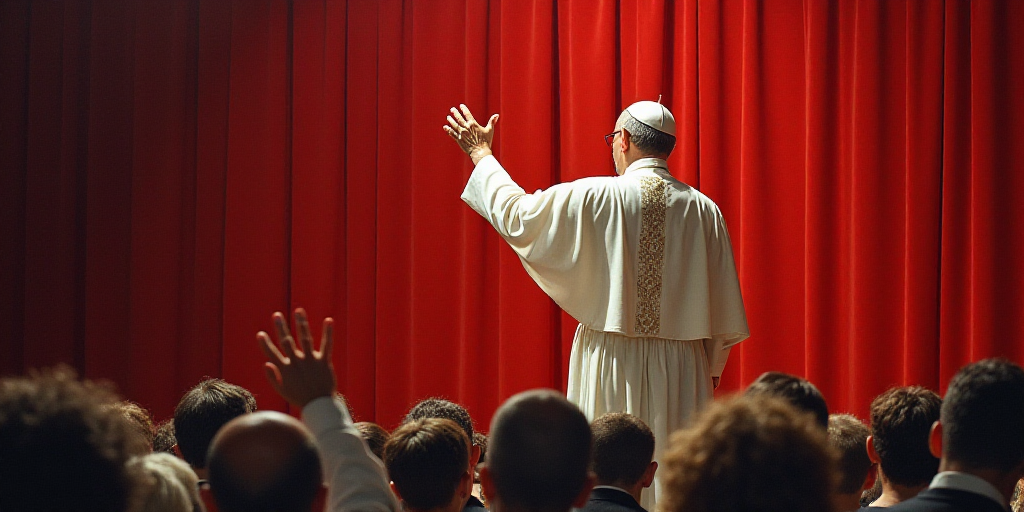Historical Context of Papal Elections
Throughout history, papal elections have not only reflected theological considerations but also global political landscapes. The recent Vatican conclave’s choice of an American pope suggests that the United States, with its growing distortion of religion, is perceived as a significant threat to faith.
The Evolution of Papal Elections
In the past, nations openly campaigned for a “papal representative,” with Italian city-states and later European powers vying for influence. However, the pomp, secrecy, and mysticism of the process (portrayed in the 2024 film “Conclave”) are designed to showcase a divine hand guiding the outcome. It’s not an ordinary political act.
During the 20th century, countries ceased openly campaigning for a “papal representative,” though politics still played a crucial role. The last time a political leader vetoed a papal candidate was in 1903, when Emperor Franz Joseph of Austria blocked the preferred candidate. Despite this, papal elections were still seen as an expression of both theological concerns and global conditions.
Historical Papal Responses to Global Challenges
Consider Benedict XV, elected just after World War I’s outbreak. Though sidelined from the Treaty of Versailles, his call for a “papal peace” led to direct negotiations between the Vatican and Francisco Jose’s successor. Ambrogio Ratti, then nuncio in Poland, refused to leave Warsaw during the 1920 Polish-Soviet War, demonstrating negotiation skills amidst rising nationalism and totalitarianism. His efforts led to his election as Pius XI in 1922.
Eugenio Pacelli, Benedict XV’s successor, further exemplifies addressing political threats. In the 1930s, Nazi Germany posed a profound challenge to civilization and Christianity. Pacelli, familiar with Germany from his time as nuncio in Baviera during the 1919 communist revolution and witnessing nazi rise, attempted to confront the German issue as Pius XII. However, his legacy remains controversial, possibly due to believing that open opposition to Nazi ideology would diminish his ability to protect European Catholics.
The Relevance of the 2025 Papal Election
In 2025, one might consider Africa the most relevant region due to its rapid population growth and strengthening Catholic presence. Cardinal Fridolin Ambongo Besungu, during the recent humanitarian crisis in the Democratic Republic of Congo, emerged as a “papabile.”
However, the conclave decided that the gravest threat to faith might be the United States’ increasing misinterpretation of religion. How should the Church respond to a form of Christianity that proclaims fundamentalism but also exhibits extreme racism and materialism, promoting a prosperity gospel contrary to New Testament teachings? How can peace be sought amidst a cynical, transactional view of international politics reminiscent of Machiavellian tactics, albeit more brutal than any prince Borgia might have employed during the Renaissance?
The US Pope: Cardinal Robert Prevost
The response to this threat is the election of Cardinal Robert Prevost, an American with extensive missionary work in Peru and high-ranking Vatican positions. As successor to Pope Francisco, Prevost is now Pope Leon XIV. Like his predecessor, he criticized Vice President J.D. Vance for advocating hierarchical, exclusive Christian love. “Vance is mistaken,” Leon XIV wrote in February. “Jesus does not ask us to establish hierarchies of love for our neighbors.”
By choosing his name, Leon XIV subtly references Leon XIII, author of the groundbreaking social encyclical Rerum Novarum (1891), which significantly influenced Francisco’s social doctrine. Leon XIII emphasized social rights, individual dignity, and “duties of justice” connecting the wealthy with the working class in an increasingly industrial and globalized world. Is Leon XIV signaling that we’ve entered a new chapter of this revolution?
Another namesake, Leon the Great (pope in the 5th century), centralized papal authority amidst internal political conflicts and used diplomatic skills to prevent Attila the Hun’s sack of Rome.
The Success of Vatican Diplomacy
Will a US pope effectively contain the threat to Christianity? The conclave’s answer is Cardinal Robert Prevost. Implementing a credible peace and social reconciliation strategy in the era of Donald Trump, Vladimir Putin, and Xi Jinping requires Renascence-style realpolitik.
Recall the 1970s, when Soviet power cracks became evident, partly due to religious factors. A resurgent Islam was growing in Central Asia and the Caucasus, while a bloody coup had occurred in Afghanistan. Soviet intervention to counter the perceived Islamic threat resulted in a costly war.
Meanwhile, growing discontent in Central and Eastern Europe (with roots in the 1956 Hungarian Revolution’s violence and Soviet repression of the Prague Spring in 1968) fueled strikes and Solidarity’s birth in Poland. The conclave responded by electing Karol Wojtyła, Archbishop of Krakow. John Paul II’s emergence brought hope that peaceful change and democratization were still possible.
Leon XIV’s Pledge for Peace
Leon XIV’s first words were “peace be with you.” In the coming years, we’ll learn if the first US pope has successfully responded to—and how—the challenge of fulfilling this promise.
Key Questions and Answers
- What does the election of a US pope signify? It reflects global political concerns, particularly the perceived threat of religious distortion in the United States.
- How have historical papal elections reflected politics? Nations once openly campaigned for a “papal representative,” with Italian city-states and later European powers vying for influence.
- What challenges have historical popes addressed? Popes like Benedict XV and Eugenio Pacelli responded to global challenges, such as World War I and Nazi Germany.
- Why was Cardinal Robert Prevost chosen as pope? He was selected due to his extensive missionary work in Peru and high-ranking Vatican positions, symbolizing a response to the perceived threat of religious distortion in the United States.
- What is the significance of Leon XIV’s name? It references Leon XIII, whose social encyclical Rerum Novarum (1891) significantly influenced Francisco’s social doctrine, signaling a new chapter in addressing contemporary challenges.






